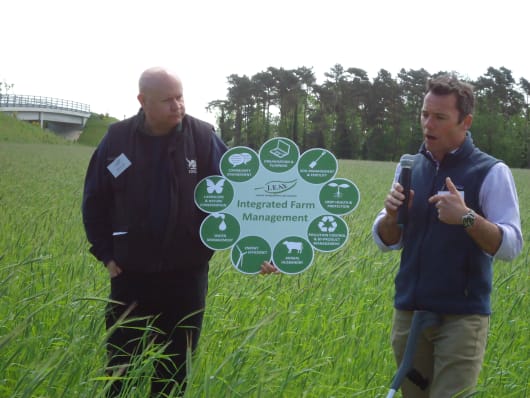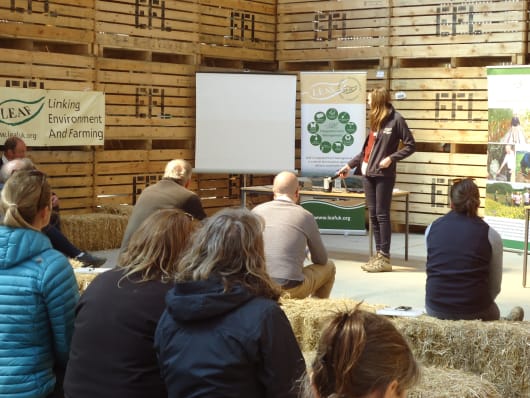Continual Improvement in Demonstration
There’s no substitute for seeing things in action. You can be told how something works, explained about the merits of a particular farming practice, extolled the virtues of a smart bit of new technology, but it is not until you actually see it in practice, in a real-life situation, that knowledge sticks. Based on the idea that farmers learn best from other farmers and want new ideas, practices and innovations demonstrated to them where it matters – out in the field – LEAF’s annual IFM Field Event aims to boost learning through this science into practice approach. We talk to LEAF Technical Coordinator (Projects), Laura Tippin about what makes an effective demonstration event.

What does success look like?
LEAF has always worked at a grass roots level providing management tools, resources, farm visits and practical on-farm training to support farmers in their uptake of more sustainable farming. Our IFM Field Event is an annual highlight, bringing together farmers, innovators and experts to highlight new trends and best practices.
The feedback we get from attendees tells us they really value the chance to see things in action. But we want to delve a bit deeper; is it doing the job we want it to do? are farmers going away with the knowledge, skills and inspiration to make changes back at home? Essentially, is the event being effective in meeting these important objectives?
As part of the PLAID project (Peer to peer learning. Assessing Innovation through Demonstration), we looked at last year’s IFM Field Event, held at LEAF Demonstration Farm, Elveden Farms in Suffolk. Our findings will join 25 other case studies from across Europe to inform practitioner and policy recommendations for demonstration events.
Delving deeper
We looked at the demonstration event itself, motivations of attendees as well as their learning and networking styles. Some 80% of attendees felt the event demonstrated a great deal of environmentally sustainable farming approaches. The remaining 20% felt it adequately demonstrated environmentally sustainable farming approaches.
We also looked at issues around “anchoring” (how to ensure messages and learnings stick both during and post event) and “scaling” (how learnings from the event ripple out to the wider industry). Attendees were asked to complete a feedback form and questioned throughout the day. Some were interviewed a month after the event and asked to reflect on the day and other demonstration events they have previously attended.
From this, we got a clear idea of some of the essential ingredients of a successful demonstration event. These included:
- Provision of new ideas and key messages to action or spark interest
- Ability to explore a wide range of topics and discussion opportunities out in the field
- Seeing theory put into practice in ‘real’ farm situations
- Networking opportunities to share ideas, experiences and make new contacts
- Providing new information or materials after the event through videos or on social media to maximise impact

Next steps
This work provided important insights which will help shape future demonstration events. Amongst these are offering follow up discussion groups and events to help track progress and innovation uptake amongst farmers, ensuring they utilise knowledge on their own businesses. We also know that videos and virtual demonstration are key tools in knowledge exchange and particularly helpful in breaking down geographical barriers to reaching those unable to attend. Finally, there is real value in working with a wide range of experts across the supply chain to share experiences and expertise across the sector.


